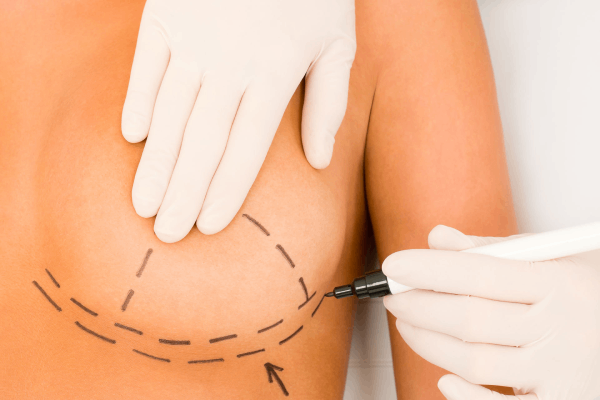Following a mastectomy or lumpectomy to remove cancer in the breast, a woman undergoes breast reconstruction surgery. As the name implies, the surgical procedure reconstructs the affected breast or breasts. Breast reconstruction surgery reforms the breast following a mastectomy (removal of one or both breasts). A surgeon also reconstructs the breast when only a section of the breast containing the cancer is removed. Both procedures change the natural look of the breast.
Fifty years ago, the technology to reform breasts was insufficient. Less tissue was spared during a mastectomy, and the loss left limited possibilities of reconstruction. The only choice for many women was to wear uncomfortable and less flattering outer breast prostheses. Fortunately, medical and scientific advances have improved options.
Today, there are two types of surgeries for breast reconstruction. Doctors might recommend implant prosthesis or autologous surgery. In some cases, a woman might receive a combination of both, which results in a very natural appearance.
Implants
Silicone or saline implants are inserted into the breast region by a plastic surgeon. The procedure requires two surgeries. The initial procedure is often performed directly after the mastectomy. A breast surgeon removes the breast and a plastic surgeon completes the process by placing expanders underneath the muscles.
The durable expanders are left inside the pectoral cavity and on subsequent visits to the plastic surgeon, additional saline is added to the expanders. This stretches the area to make room for the actual implants, which will be implanted in a second and less invasive surgery. Because the process begins with the mastectomy, the appearance of the missing breast tissue is subtler.
The plastic surgeon will continue to add saline into the expander, until the area is expanded enough to insert the correct size breast implant. You may have some say in determining the breast size you want. However, there are a number of issues that the plastic surgeon must take into consideration, including the skin area available and your body’s size and frame.
Finally, the expander will be removed and the surgeon will replace it with the silicone or saline implants. This is a less invasive process and is usually completed as an outpatient procedure.
There are reconstruction cases where the surgeon eliminates the step involving the expander and the final prosthesis is simply inserted when the mastectomy is performed.
Autologous Surgery
Also referred to as skin flap surgery, autologous surgery utilizes tissue that is extracted from another part of the body.
Tissue that is removed from the patient’s body is most often extracted from the stomach area, but can also be removed from the patient’s back, thigh or buttocks. There are two types of procedures that fall under the umbrella of autologous or skin flap surgery.
- Free Flap For free flap reconstruction, the surgeon will remove all tissue and blood vessels from the donating area and replace/restitch them into the placement site, matching blood vessels that are present. This is a complicated surgery and a microscope is required for accuracy.
- Pedicle Flap This procedure is less complex than free flap surgery. In a pedicle flap procedure, the surgeon does not completely remove the tissue from the donating area and simply transposes it to the breast.
Why Choose Breast Reconstruction Surgery?
Reconstruction helps a woman heal emotionally as she may be able to better accept her new appearance. With reconstruction, scars from the mastectomy (physical and emotional) are often minimized. Natural appearance is important to many women and a breast reconstruction surgeon can assist with that, even rebuilding the nipple and areola area when it is affected by cancer.
If you or a loved one are facing a mastectomy or lumpectomy and are feeling vulnerable about what’s to come, we can help. Dr. Louis Iorio is a board certified plastic surgeon and general surgery. Call us to make an appointment at our Colts Neck 732-780-9191 or Brick 732-458-7400 locations. You can also request a consultation online.


